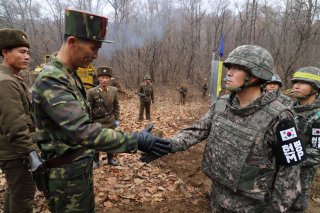Diplomacy and Deterrence Forever? How South Korea Can Deal With North Korea in the Future
The threat of escalation and strategic instability is real, but peace can be maintained and maybe improved.
This is why South Korea should keep calm and carry on, using both diplomacy and deterrence, as it often has. Washington may be upset at a failure to secure a denuclearization deal, but Seoul has lived with North Korean nuclear weapons for a long time. As Ms. Jeongmin Kim laid out, “The hostile relations between North Korea and the United States is accelerating the feeling of insecurity in the North Korean regime. For the status quo, I think it is wiser to recognize North Korea as North Korea is right now, understand what kind of insecurity North Korea has, and then try to manage the risks rather than going to an extreme solution like regime change or perhaps near-term unification.”
“The policymakers in Seoul can’t really go anywhere without the United States getting on board, so their hands are already tied,” Ms. Jeongmin Kim reiterated to TNI. “But what they can do is create this friendly environment for future South Korean and U.S. presidents for a potentially elongated deal with North Korea—which is probably going to happen. It is not going to be done in the short-term. It’s going to take years, decades even. So I think it would be wiser for Seoul, for now, to prepare for what Seoul can do after Moon Jae-in.” Ms. Jeongmin Kim advised this means President Moon Jae-in’s party needs to be careful going forward to ensure it doesn’t lose supporters in favor of engagement who might matter years down the line.
Conclusion: Deterrence and Diplomacy Forever?
“South Korea will try to persuade North Korea to calm down and also try to persuade the U.S. to persist in the status quo on the Korean peninsula because even a small military dispute could lead to full-scale war on the Korean peninsula,” predicted Dr. Jihwan Hwang. Even with minimal progress, he sees Seoul as maintaining its role as messenger and peacemaker.
Unless Seoul and Washington had a dramatic split, South Korea’s current administration is likely going to straddle a difficult line between seeking engagement with Pyongyang while not going further than America wants. Until either administration changes its priorities or is voted out, there will likely be no dramatic improvement beyond what has already been seen or tried. Washington’s insistence on upfront denuclearization is a nonstarter, and a return to maximum pressure likely wouldn’t work. Instead, maximum pressure 2.0 would just raise tensions.
The present status-quo can persist, but eventually something might have to give. For example, Seoul might not always be so willing to appear in agreement with American policymakers. Dr. John Delury warned, “Washington needs to understand Moon Jae-in is the nicest liberal they are going to find.” That is something both the current and future U.S. administrations to consider.
Dr. Chung-in Moon told TNI, “Up to now, President Moon believed that by taking sides with the United States, having close coordination with the United States, that would facilitate U.S.-North Korean negotiations. Then we can have better and more stable inter-Korean relations. But we put all our eggs into one single basket—the United States—even risking souring our relationship with North Korea. And now the U.S. and DPRK aren’t making any progress, and North Korea is mad at us.”
This is why it is important Seoul acts now so when tensions rise again, they will not get out-of-hand. After all, as Dr. Chung-in Moon warned, “We are in a very difficult position because we are hoping the United States would make a major breakthrough so we can revitalize inter-Korean relations. If the United States returns to the working-level talks with a new method and new calculation, maybe North Korea will accept it. If the U.S. responds, then our betting will work. If not, there’s a great chance for crisis and escalation reminiscent of 2017.”
Editor’s note: John Dale Grover is a Korean Studies fellow at the Center for the National Interest. He visited Seoul for a week in early November 2019 to interview nine experts in South Korea for this project. This is the fifth piece in a five-article series, “How South Korea’s Politics and Military Impacts Strategic Stability with North Korea.” This series examines the two South Korean views—Engagement First vs. Deterrence First—over how to best interact with North Korea. The first piece introduces the problem of conflict escalation and stability in the context of North and South Korea’s militaries. The second piece looks at the Engagers’ point of view, and the third piece at the Deterers. The fourth piece sees where both groups agree and disagree, and the fifth piece concludes with how each side can help avoid a Second Korean War. Support for the reporting of this article was provided by a fellowship from Atomic Reporters together with the Stanley Center for Peace and Security and funding from the Carnegie Corporation, New York. The quotations in this article have been edited for length and clarity.
Image: Reuters

